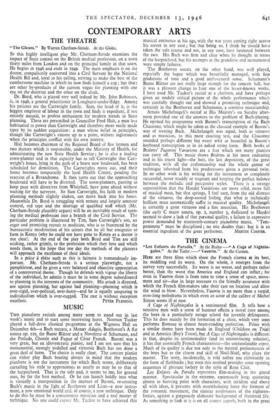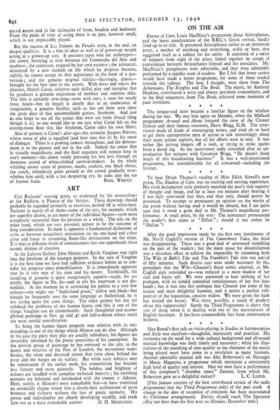THE CINEMA
HERE are three films which show the French cinema at its best, its middling and its worst. On the whole, it emerges from the survey very successfully. Its worst is no worse, and perhaps rather better, than the worst that America and England can inflict ; for even in Vautrin there is from time to time a sense of space, move- ment and air—due in large measure to the friendly assurance with which the French film-makers take their cast on location and allow the wind to blow. Nevertheless, Vautrin is no more than a turgid, over-long melodrama in which even an actor of the calibre of Michel Simon seems ill at ease.
A Cage of Nightingales is a sentimental film. It tells how a sensitive man with a sense of humour effects a moral cure among the boys in a particularly savage school for juvenile delinquents. This he does mainly by the formation of a choir, which very soon performs Rameau to almost heart-rending perfection. Films with a similar theme have been made in England (Children on Trial) and in America (Boy's Town), but A Cage of Nightingales is different in that, despite its sentimentality (and its unconvincing solution), it has that essentially French characteristic—the untranslatable esprit. Much of its quality is due not only to the natural performances of the boys but to the charm and skill of Noel-Noel, who plays the master. The story, incidentally, is told rather too elaborately in the form of flashbacks ; but even this method provides some opening sequences of pleasant foolery in the style of Rene Clair.
Les Enfants du Paradis represents film-making in the grand manner. Spectacular in the extreme, enormously long, quivering almost to bursting point with characters, with incident and above all with ideas, it presents with overwhelming force the ferment of the romantic movement, the sinister restlessness of the eighteen- forties, against a gorgeously elaborate background of theatrical life. As something to look at it is on all counts superb, both in the great crowd scenes and in the intimacies of foyer, boudoir and bedroom. From the point of view of acting there is no part, however small, which is not impeccably played.
But the success of Les Enfants du Paradis rests, in the end, on deeper qualities. It is a film of ideas as well as of grown-up people acting in a grown-up way. It presents types who are archetypes— the clown, hovering as ever between the Commedia del Arte and madness ; the courtesan, trapped by her own easiness ; the aristocrat, destroyed by a new outlook on life which he despises because, rightly, he cannot accept its first appearance in the form of a per- version ; and the genuine original nihilist—Stavrogin, almost— brought for the first time to the screen. With these and others the director, Marcel Came, achieves such skilful play and interplay that he produces a genuine excitement of intellect and emotion alike. The film is certainly over-long—even with cuts, it runs for nearly three hours—but its length is clearly due to an exuberance of imagination, a genuine fertility, such as has not been seen since the great days of that uncontrollable genius, Stroheim. And just as one longs to see all the scenes that were cut from Greed (long though it is), so one would like to see just what Came left on the cutting-room floor (for, like Stroheim, Came edits his own films).
Also of account is Came's alter egohis scenarist Jacques Prevert, whose sense of plot is equalled (and how rare this is) by his sense of dialogue. There is a probing camera throughout, and the dénoue- ment is in the picture and not in the talk. Indeed the entire film is visually magnificent, and the final sequence will remain long in one's memory—the clown vainly pursuing his lost love through an immense crowd of white-clothed carnival-makers. In the whole whirling snowy scene of pierrots, masks, confetti, one black object, the coach, relentlessly gains ground as the crowd gradually over- whelms him until, with a last despairing cry, he sinks into the sea



































 Previous page
Previous page